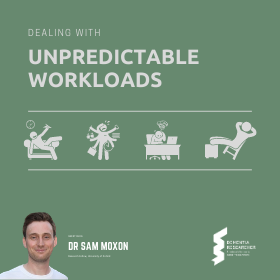I remember one of the first things my PhD supervisor said to me. We grabbed a coffee on my first day so we could sit down and discuss the project. He told me to expect peaks and troughs during my research. Some weeks I would have very little to do while I waited on a multitude of things. Other weeks would be far more “full-on” as experiments culminate and deadlines approach. That was certainly the case and it has continued to be during my academic career. There are days where the work is non-stop and I struggle to fit everything in while other days, I find myself sat in my office drinking coffee and trying to find things to do. If I’ve learned one thing from my career so far, it’s that I hate the slow days and I love the busy ones.
If I’ve had a busy day at work, I come home feeling fantastic. I feel like I have contributed and the productivity is addictive. There is a genuine buzz about me and, even though I have been working all day, I feel full of energy. The slow days do the opposite for me. I feel unproductive and drained and I lose a lot of motivation. I am not the only one who feels like this as well. Academia is well known for having unpredictable workloads and it can be an emotional roller coaster as a result. I know many who have left academia for this reason. They need consistency in their work life and I totally understand why. However, I do not want to leave. I feel I have found my vocation and, instead, I think the best thing for me is to try and better deal with unpredictable workloads. If you feel the same, maybe these tips will help you get used to the peaks and troughs.
 Let’s start with the troughs; the times when you are waiting for cells to grow, equipment to get fixed or for someone else to do their part of a study you are involved in. These times can be frustrating because it can feel like nothing is moving forward and you can’t do anything to speed things up. That might be the case; you certainly can’t make cells grow any faster. You may, however, be able to speed up other processes that are slowing you down.
Let’s start with the troughs; the times when you are waiting for cells to grow, equipment to get fixed or for someone else to do their part of a study you are involved in. These times can be frustrating because it can feel like nothing is moving forward and you can’t do anything to speed things up. That might be the case; you certainly can’t make cells grow any faster. You may, however, be able to speed up other processes that are slowing you down.
One thing that has become evident to me over the years is the fact that people who work at a university are jugglers. They have a wide variety of jobs each week and they have to work out how to prioritise their tasks in order to get stuff done. This ties me into my first snippet of advice if you are tired of sitting around waiting for things to happen. Don’t be afraid to chase people about something you need. Whether it’s training, access to a lab, samples (the list can go on), make sure the person you are relying on knows it is important. That way they will prioritise you and you won’t be in for a long pause in your work.
There are, however, times where you are in a trough because there is literally nothing you can do. Academics hate these periods and I think it’s partly because their research is important to them. They want to be active. They need to be investigating something. Nothing makes me feel worse than being sat in my office with nothing valuable to do. The key here is trying to resolve the boredom. Working at a university provides you with far more than just a good work environment with like-minded individuals. It also provides you with a wealth of learning opportunities. There are a multitude of online learning resources and training courses you can take advantage of. A lull in your work can provide the perfect opportunity to learn about coding, new imaging techniques, 3D modelling… the list goes on. You never know when this stuff might come in handy so take the opportunity to learn.
So what about the other end of the spectrum? When everything seems to come together at once and you have to do a lot of work in a very narrow time window. Simply put, there is only one way to handle this kind of situation. You have to be organised and you have to prioritise. There are a few different ways to do this but, personally, I like to write down a plan for each day. I open my journal, note down the week commencing date and write each day down with a gap in between for tasks. I then assign tasks to each day based on priority. It is easy to get overwhelmed in these scenarios, especially if you look at everything all at once. A schedule helps you segregate the workload into a series of manageable tasks. I also enjoy ticking a task off on the list when I complete it. It gives me a sense of productivity and self-satisfaction. I should also note that this technique works in the lulls too. Writing out each day and “making plans” ensures productivity.
Most importantly though, make sure you factor in time to relax as well. Burning the candle at both ends only leads to one thing and it’s not good. Burnout is no joke so make sure you’re taking time to yourself where possible. Sometimes the workload can be extreme so don’t feel guilty if you take a bit of time during the following “lull” to rest and recover. Your health always comes first.
Author

Dr Sam Moxon
Dr Sam Moxon [1] is a biomaterials scientist, and his expertise falls on the interface between biology and engineering. His PhD focussed on regenerative medicine and he now works on trying to improve on culture techniques for human stem cells, so that we can gain a better understanding of how diseases like Alzheimer’s manifest. His work at The University of Manchester looks at 3D bioprinting with stem cells. Outside of the labhe hikes through the Lake District and is an exert on all things Disney.
What advice do you have for managing unpredictable workloads? Reply in the box below